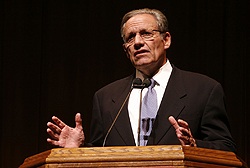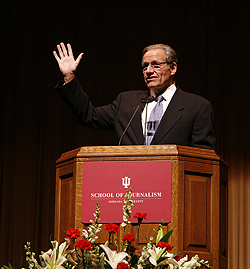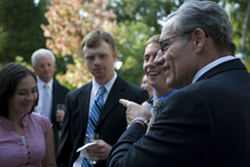Woodward: ‘Journalism is not stenography’
By Jonathan Hiskes

Bob Woodward offered a surprisingly simple bit of journalism advice Monday night in the IU Auditorium.
“Work at night,” the Pulitzer Prize-winning journalist told the young reporters in the crowd of nearly 2,000.
During the daytime, officials are unlikely to talk beyond the 20-minute appointments they have reserved in their calendars, Woodward said. At night, they might end up speaking for hours, giving valuable, candid information.
The Washington Post assistant managing editor, best known for unearthing the Watergate scandal with fellow reporter Carl Bernstein, said his family doesn’t always like his nocturnal work habits. But he believed in the instruction enough to repeat it two more times during his speech, the first of the year in the IU School of Journalism Speaker Series.
“The job of journalism is not stenography. It is getting the full story and the meaning of that story,” said Woodward, the author of 11 best-selling books, including All the President’s Men (with Bernstein), and, most recently, State of Denial: Bush at War Part III.
His talk returned frequently to his unprecedented access into the White House for his trio of books on the Bush Administration’s responses to 9-11. He interviewed President Bush for three-and-a-half hours over two days, which he called the longest interview on a single subject ever granted by a sitting president.
He recalled one of Bush’s statements that he found especially troubling: “He said, ‘I believe we have a duty to liberate and free people,’” Woodward said. He noted that the Constitution requires no such duty of the president.
“Duty is the biggest word in the English language for the president of the United States,” he said.
He cast the president’s conviction as the driving force that led to the invasion of Iraq, which he describes as a poorly-planned disaster in State of Denial. He accused Bush of ignoring dismal intelligence reports from Iraq and of “absolute, total contradiction and denial” in his insistence that the war was going well.
He also said journalists should have challenged more thoroughly the administration’s claims about weapons of mass destruction in Iraq.
“Journalists generally failed on this issue,” he said. “I personally failed. [But] Congress had already authorized the war. Bush was determined to go to war.”

He did not share the anger that two Nation magazine editors brought to the School of Journalism earlier this month for a panel on “What’s Right and Wrong with the Media.” There, Nation contributing editor Stephen Cohen lashed out at news outlets, including the Washington Post, which they said promoted journalists who failed to question the Bush administration’s claims about weapons of mass destruction in Iraq.
“There is no sense of institutional accountability,” Cohen said of the news media.
By contrast, Woodward showed less emotion about the stories he has chronicled, occasionally using the Bush administration’s follies as punch lines. He noted that Paul Wolfowitz and other war architects predicted the Iraq war would last only seven days.
“They were off,” he said, drawing laughs.
He told an anecdote about visiting a Pottery Barn after he had quoted Colin Powell’s “Pottery Barn” phrase about toppling a foreign government: “You break it, you own it.” A clerk reportedly told Woodward the store doesn’t even have that policy, but now everyone is afraid to touch its products.
“The unintended consequences of going to war,” he joked.
He did not mention the humanitarian consequences of the war, either in Iraq or in the neighboring countries to which refugees have fled. He did remain solemn, though, when speaking of the administration’s use of secrecy, which he called its greatest threat to democracy.
“Democracies die in darkness,” he said. “Nixon tried it and it didn’t work. The more secret government gets, the worse it gets.”
He said Bush discouraged his cabinet from speaking of an insurgency in Iraq at the end of 2003 in hopes that the problem would not become public.

A number of journalism professors required their classes to attend the talk, but the crowd appeared to include as many community members as students.
“Bob Woodward brings the facts to us,” said Bob Miller of Bloomington, a U.S. Navy Vietnam veteran. “A lot of journalists do the opposite. They suppress the facts.”
“He was pretty interesting,” said sophomore Lauren Clason, a journalism major. “The fact that he got all that time with the president — that’s a powerful man.”

